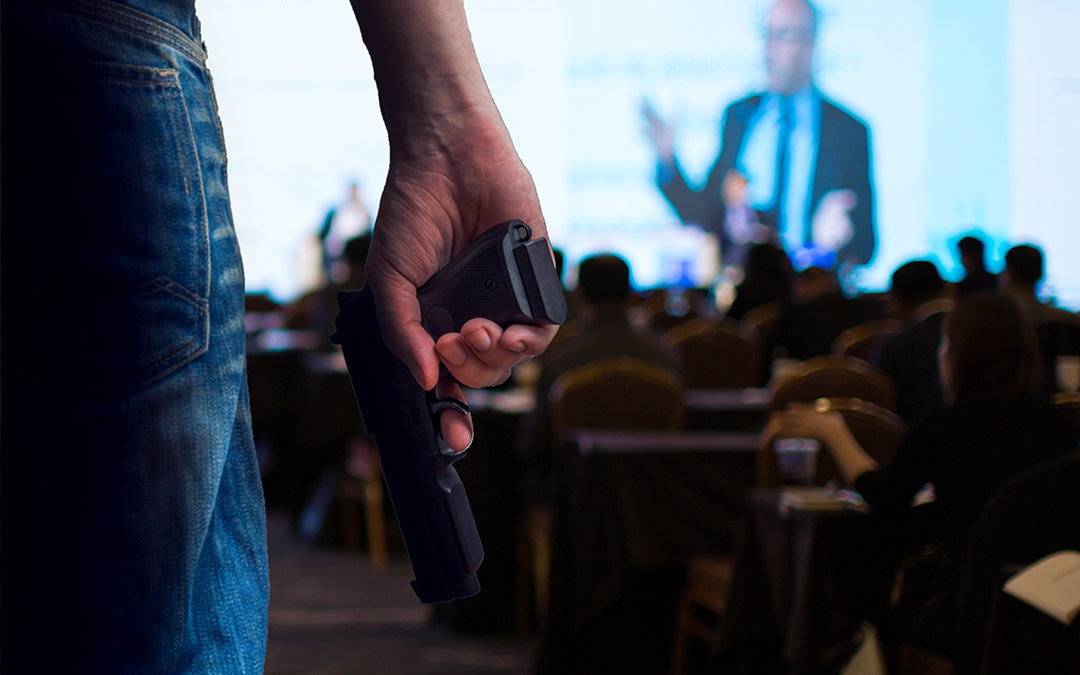Guns, Mass Shootings & The Events Industry: Our Missing Voice
Note: versions of this column have appeared this week in Meetings & Conventions magazine, and BizBash. A forthcoming story on this initiative will also appear in the November issue of PCMA’s Convene magazine.
For a number of years, I’ve been giving a presentation at industry conferences on Disruptions Facing the Events Industry. Of all the various potential disruptions – economic, political, technological, social, etc. – gun violence and mass shootings at events is the one I’ve been most worried about. They pose an existential threat to the meetings and events industry: to the safety of our event attendees, the viability of the businesses that produce them, and the livelihoods of the people they employ.
As of this writing, the deadliest mass shooting in U.S. history (the 2017 Route 91 Harvest music festival in Las Vegas, in which 59 people were killed) took place at an event. Other mass shootings in recent years have also occurred at events: a movie premiere, a food festival, an employee gathering. Mass shooters find target-rich environments where people gather: schools, places of worship, nightclubs, and, of course, live events.
On September 12th, 145 CEOs sent a letter to the Senate urging them to take action on this issue, including Uber, Levi Strauss, Dicks Sporting Goods, Gap, Twitter, Condé Nast and Omnicom, as well as event & hospitality industry companies Eventbrite, Airbnb, Splash, Royal Caribbean Cruises and Stanlee Gatti Designs. It is long overdue that our industry join this effort.
The ‘Duty of Care’ Imperative
At its core, this a safety issue. The duty of care principle calls for planners to do whatever is reasonably feasible to safeguard the well-being of event attendees, staff and other stakeholders. When thinking of all the things that could go wrong at an event, surely nothing would be worse than mass murder.This is our responsibility, plain and simple. Just about any other safety risk would galvanize the events industry to action on numerous fronts. Yet the only discussions I’ve seen in the industry have focused on reactive measures, such as increased security and active shooter drills, which is not enough. That’s like reacting to a string of e coli outbreaks at events by telling planners to stock extra Petpo Bismol, but not even trying to lobby the Food & Drug Administration to increase food safety oversight. We can, and must, address both the cause and the symptoms.
The Business Risk
One of the 9/11 Commission Report’s most haunting statements is that those attacks could have been foreseen and prevented, but for a failure of imagination on behalf of the intelligence agencies. This shouldn’t be a problem for our industry, since there have been shootings at festivals and other events. If, however, you’re thinking, “Yeah, but that’s different; I plan conferences,” let’s paint an image closer to home.Picture someone committing a mass shooting at the most important, high-profile event you work on. What would the fallout be for that event and your organization? What lawsuits would your company be facing? All your events would suddenly have a much less attractive risk/reward calculus for company leaders. And if you did move forward, how big of an attendance drop would you see? How many sponsors would pull out? How muted would the attendee experience be? Other companies would follow suit and likely cancel or dramatically curtail their own events. If a mass shooting occurred at a banking conference, for example, you can bet that executives at the other banks would be re-evaluating their event plans as well. [It doesn’t take much to mar the optics of events to business leaders; just look back at “the AIG effect”.] Attendees outside the U.S. will start re-thinking coming to events here. In fact, more countries are issuing advisory warnings about the risks of gun violence when traveling to the U.S. The events industry could take years to recover.
Increased Costs
Further, events would start to incur significantly higher security costs, due to additional guards, metal detectors, physical barriers, surveillance cameras, etc. Registration lists may have to be scrutinized more carefully. Tighter security for vendors at the loading dock would slow the installation process, require longer rental periods. The small armies of catering and event staff may have to go through background checks. Insurance for venues, hosts and vendors would increase.
Open Carry Laws
While a mass shooting is clearly the worst of the gun scenarios, event attendees openly carrying firearms should also be a cause for concern. Picture the impact of someone with an AR-15 slung over their shoulder walking your show floor, or someone with a holstered handgun arguing with registration personnel. Or whether it would stifle debate of a controversial topic at a panel discussion if one of the participants displays a gun.And even if you’re able to bar firearms at your event, which a number of states won’t allow you to do, it’s unlikely you’ll be able to stop people from being armed in common areas (e.g. convention center or hotel lobbies) or ancillary event sites like restaurants. (See Can We Keep Guns Out Of Meetings?)Currently 44 states allow open carry of long guns (rifles and shotguns). Further, 31 states allow open carry of handguns with no permit required, while another 15 states require some permit or license. (Source: Giffords Law Center)
Where Is the Industry’s Voice?
Given the potentially devastating impact of guns and gun violence, it’s surprising, and quite frankly disappointing, that the meetings and events industry hasn’t been more vocal in advocating for sensible gun safety. We have a voice when we want to use it. The movement to fight human trafficking has received broad support at the highest levels. The same can be said of incorporating sustainability and inclusiveness practices. When Charles Schwab recently announced they were curtailing incentive travel due to “significant reputational risks”, the Incentive Research Foundation immediately pushed back. Ah, but those issues aren’t controversial, some might say. No one is actually in favor of human trafficking, right? Well, look at the industry’s response to recent anti-LGBTQ state laws, which did have strong support in those states.
- When Indiana passed a religious freedom law (noted by the case of the baker who refused a gay wedding client on religious grounds), a convention industry backlash caused them to rethink it.
- When North Carolina passed a bathroom bill requiring transgender people to use the rest room of their birth certificate gender, numerous organizations pulled their events.
- When Tennessee passed a law enabling therapists to refuse to treat patients if it would conflict with a religious belief, the American Counseling Association pulled their 2017 convention out of Nashville, even though it cost them $750,000 in cancellation fees. (See Convene: The Cost of Conscience)
This is not a zero-sum issue: tackling gun safety at events need not come at the expense of any of these other worthwhile causes. We can walk and chew gum at the same time. What will it take before we start speaking out on the mortal threat gun violence poses to our businesses and the people we are charged with safeguarding at our events? Where is our outrage?
Taking A Stand
Now is the time to act. Let’s not wait until yet another atrocity occurs at an event. In addition to our own efforts to enhance security and preparation, we must also work to address the root cause. Let’s start by advocating two policy initiatives already enjoy widespread (and bipartisan) public support, and can make a huge impact:
- INSTITUTE UNIVERSAL BACKGROUND CHECKS by having the Senate pass the Bipartisan Background Checks Act of 2019 (H.R. 8) which passed the House of Representatives on 2/27/2019. This closes the ‘gun show loophole’ which exempts private sales from standard background checks. 90% of Americans support this (source: Fox News poll).
- REINSTATE THE FEDERAL ASSAULT WEAPONS BAN (which also covers high capacity magazines) that expired in 2004. Weapons of war should be reserved for the military, police and other properly trained security forces. 70% of Americans support this (source: POLITICO/Morning Consult poll).
This is the bare minimum our industry should support, and is still a far cry from the regulations in most industrialized countries. We’re not talking about an Australia-style ban, or requiring gun owners to take a vision and skill test like we do for drivers’ licenses. [And if you’re on the fence because of arguments posited by gun industry lobbyists, get the facts, look at the data, and make your own decision.]
Here are a few things you can do:
- Sign the Petition for Gun Safety at Events on behalf of our industry, supporting the two basic gun safety proposals outlined above, which will be delivered to members of Congress and state legislatures, in consultation with with the corporate affairs team at Everytown for Gun Safety.
- Join a growing coalition (to be announced shortly) of ceos, thought leaders, influencers and industry professionals who want to make a difference. Please email me directly to get involved.
- Contact your elected officials and let them know how this issue affects your events and businesses.
- Speak out. Share your concerns on social media. Email editors at industry publications. Talk to your association leaders.
Make your voice heard. Stand up and be counted. The current system is unsustainable and we must work toward a solution together. Your event attendees’ safety, and your livelihood, depend on it.
Author’s Note
The opinions listed here are mine and mine alone, and do not necessarily reflect the views of ELI’s instructors, staff or supporters. I understand that some of you may be angered by my expressing these views in a professional setting, and may cancel your ELI subscriptions, withdraw from our professional development courses, or otherwise stop supporting us. We’re not a large organization and losing any customer will have a significant impact, but I feel strongly this is worth that risk, and I encourage others with similar concerns to join me in taking a stand. This is about the business risks to our industry and the safety of our event attendees, not about politics. As Joan Allen’s character said in The Contender, “Principles only mean something if you stick with them when they’re inconvenient”.
Special thanks to those of you who provided invaluable guidance and support in helping me frame these views in a constructive and impactful manner. I look forward to your continued leadership on this initiative in the coming weeks and months.



